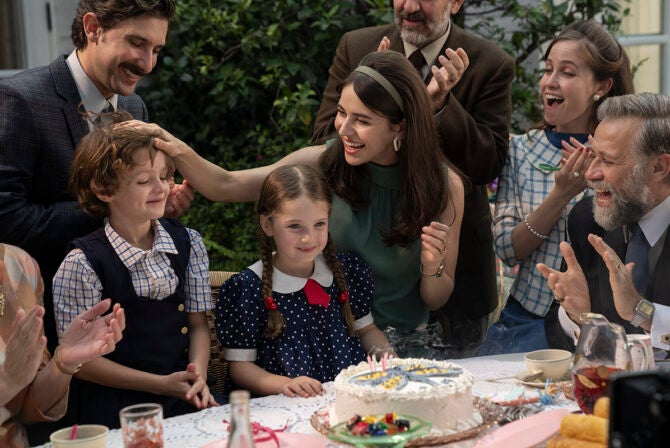Refresh.
Refresh.
Refresh.
If you’re anything like me, you’re probably getting ready to send kids to overnight camp right about now. So, in addition to shopping, labeling, and packing, you may also be warming up your finger, getting ready for your most frequent summer activity: Refreshing the camp photos website, scanning faces in hopes of finding your child(ren) among the smiling masses.
If you’re lucky enough to catch a glimpse of your kid, your brain will likely fill with questions that you’ll desperately extrapolate from the photo:
Do they look happy?
Do they look fed?
Are they with their sibling(s)?
Are they seriously wearing that shirt again?!
Was that a tear? I think it’s a tear. Why are they crying?
Have they actually washed their hair with shampoo?
My now 9-year-old daughter had her first Jewish overnight camp experience last summer. Before she left, I was convinced that I was not going to be one of those parents — the ones who simply cannot let go. But there I was. Instead of spending the 13 days she was away being more focused at work and enjoying the extra “free” time afforded by one less child to think about, I filled my time by constantly looking for her face among the hundreds of photos posted on the camp website each day.
To be honest, I’m not even sure why I did it. I love my daughter to no end, but I had been managing an injured toddler at home, so to have one child out of the house (I have three) felt like a relief. Especially since I knew she was somewhere safe and fun, and not dealing with our day to day hassles at home. Plus, she is fiercely independent — she’s the type of kid who always looks forward, never back.
And, of course, my daughter was completely fine while she was at camp. To quote one of the two postcards she sent, she had a “sweet life here at camp.” I seriously doubt she was worrying much about us. The photo book I made as a surprise and tucked away in her duffle was probably all she needed to feel connected — if she unpacked it at all, that is.
Yet there I sat, spending hours each day looking at the photo streams, searching for her face.
When my clearly more mature daughter came back from those two weeks, I was left asking myself: Was that constant refreshing — that desire to know what she was doing, the need to see her face — really healthy for me? For us? And what does it do to her camp experience, to know that the cameras are there and that I will be looking for her? Why am I so concerned that she’s happy and having fun? After all, when she’s home, she is definitely not always happy, and she doesn’t always have fun, and I am completely OK with that.
Plus, as we all now know from social media, photos never tell the whole story. People put forth the things they want you to see, and you never know what really underlies an image. Just because a couple looks incredibly in love at their anniversary dinner doesn’t mean they weren’t fighting in the car on the way to the restaurant. And for every vacation photo of a happy family, there were probably a dozen deleted images because someone was crying.
But what’s different about the camp photo stream is that there is not time to edit the images in the same way — they’re not only the happy shots. And it’s those ambiguous pictures that can lull us into perceiving these photos as truths. We forget that there’s context — something a photo usually cannot provide. And it is in this ambiguity where we run the risk of reading too much into a single second of a very long day.
Take that picture of all your child’s bunkmates, minus your kid. Is she being left out? Or maybe she was just in the bathroom? Or that picture where they seem on the verge of tears? Maybe the photographer caught them mid-sneeze. Or what about that one of my daughter, looking incredibly bored with what appeared to be a morning Torah study session? Well, OK. That one may be accurate.
Many of us send our kids to camps where they can have device-free weeks in which they can truly disconnect. I loved that my daughter was “unplugged” but, in hindsight, I don’t love that I opted to stay plugged in. My daughter didn’t know what I was doing, wearing, or eating each day. Did I really need to know all these details about her?
This summer will be different. My daughter will be going away for an entire month, and my goal is to really let go this time — which means not constantly looking, not constantly refreshing the photo page. Just as my parents had to do when I went to camp as a kid, I will wait until my daughter comes home to look at photos. We can excitedly pour over all of the pictures together, and she can tell me the stories behind the images.
While she is away I will try to enjoy the freedom, independence, and fun that summer camp can provide — for both my daughter and me. And I will try to work on refreshing myself, not the page.








